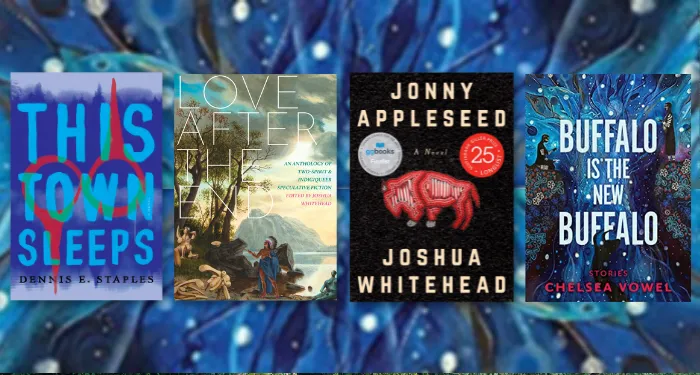
10 Works of Queer and Two-Spirit Indigenous Fiction You Need To Read
I spend a lot of time reading, thinking about, and writing about queer books. I make a lot of queer book lists. Over the years, it has gotten easier and easier to make lists of queer books in various sub-genres, or that focus on a particular identity, place, time period, or culture. Browse through Book Riot’s LGBTQ+ archives and you’ll find hundreds of lists highlighting queer books of all kinds: books about queer parents, LGBTQ+ South Asian books, queer roller derby books, and queer Black romances, to name just a few.
But publishing still has a long way to go, and a lot of reckoning to do, because there are still far too few queer Indigenous stories out there. There are more than these listed in this article, of course, but not nearly as many as there should be. A lot of book lists focusing on queer and Two-Spirit Indigenous literature also include poetry and nonfiction — which is wonderful! Poets like Tommy Pico, Natalie Diaz, and Billy-Ray Belcourt are doing extraordinary work right now. But queer fiction is my first love, and I’m always hungry for more queer stories of every kind. So I’ve made it my mission to read all the queer Indigenous fiction I can get my hands on.
This list is by no means exhaustive. I’ve focused on books by Indigenous and First Nations writers in the U.S. and Canada. It’s a mix of YA and adult books, and includes contemporary fiction, fantasy and sci-fi, and speculative fiction. These books have opened up new worlds for me. I can only hope that if enough of us get loud enough about the kinds of stories we want to read, publishing will have no choice but to listen. So please join me in loudly celebrating these excellent novels and story collections.
Adult Queer Indigenous Fiction
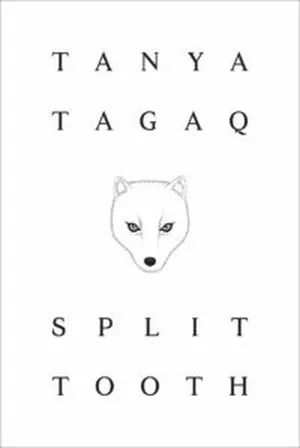
Split Tooth by Tanya Tagaq
This beautifully strange novel follows an Inuk girl growing up in Nunavut in the 1970s. It’s a complicated, non-linear story that ignores expected Western tropes about form and structure. At times, it’s a straightforward coming of age story, with vivid descriptions of teenage life in a small Arctic town. But Tagaq also weaves dreams and the supernatural into the narrative: nothing happens quite the way you expect it to happen. I can’t recommend the audio version enough; Tagaq reads it, and in addition to her stunning narration, she throat sings between each chapter.
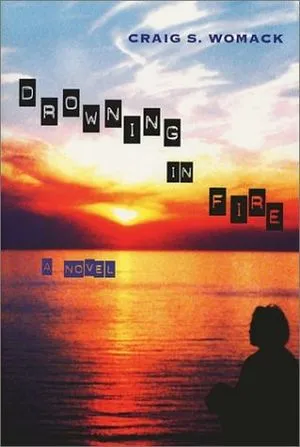
Drowning in Fire by Craig S. Womack
This is another wonderful queer coming-of-age story, this one set in the Muskogee Creek Nation in rural Oklahoma. Josh’s attraction to boys has always made him feel different from his peers. He’s not sure where he belongs, and the conflicting messages all around him don’t make it easy to figure out. But when he listens carefully to his elders’ stories, the world of his Creek ancestors comes alive, and Josh learns to see himself in a new way. The narrative weaves back and forth between past and present, blending history and dreams into a moving story about self-discovery and ancestral knowledge.
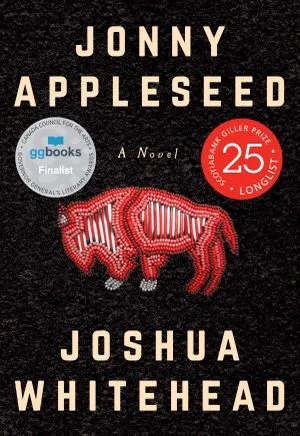
Jonny Appleseed by Joshua Whitehead
This book is a riotous mess of emotion: it’s funny and heartbreaking, full of loneliness and loss, harsh one moment and full of gentleness the next. Jonny is a twenty-something Two-Spirit Indigiqueer just living his life, paying the bills with his job as an online sex worker and hanging out with his friends. When his mom’s boyfriend dies, he has a week to find enough money to get back to the rez for the funeral. Over the course of the week, he goes about his life, reflects on his childhood, and shares memories of his mom and grandmother. It’s a thoughtful, introspective novel about a character with a singular voice, pulsing with life.
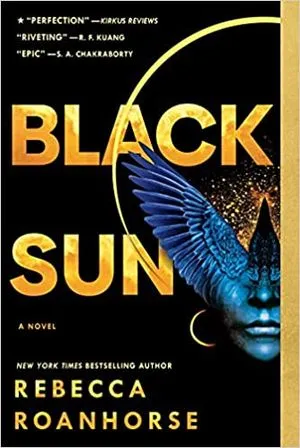
Black Sun by Rebecca Roanhorse
This epic fantasy, set in a kingdom inspired by the Indigenous peoples of the Americas, is full of casual queer and trans representation! The story follows several characters, all of whom are traveling to the holy city of Tova in preparation for a once-in-a-lifetime celestial event that has the potential to change the world forever. If you like detailed worldbuilding, fascinating magic systems, political intrigue, dangerous quests, and characters with rich backstories and complex motivations, this book is for you.
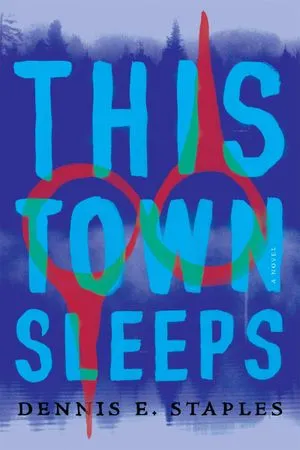
This Town Sleeps by Dennis E. Staples
Set on an Ojibwe reservation in northern Minnesota, this quiet novel is part ghost story, part murder mystery, and part slice-of-life story about life in a small community. Marion is a twenty-something gay Ojibwe man who’s just returned to his hometown and begun an affair with a closeted white man. When he encounters a ghost one night, it leads him into an investigation of a decades-old murder. Staples has a particular talent for capturing ordinary moments, as well as the messy tangle of relationships, memory, trauma, family, geography, and violence that permeate life for Marion.
YA Queer Indigenous Fiction
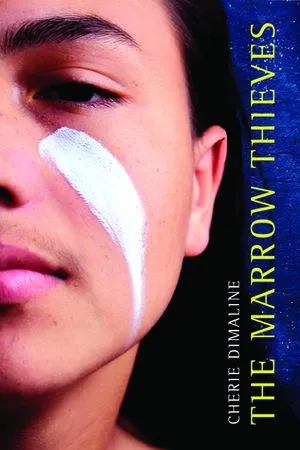
The Marrow Thieves by Cherie Dimaline
In a bleak dystopian future, white people across North America have lost the ability to dream, and this dreamlessness comes with devastating consequences. The bone marrow of Indigenous people holds the only cure, and thus governments have started hunting and rounding up Indigenous people in a terrifying 21st century version of residential schools. Frenchie is an Indigenous teenager on the run with his found family, a group of other teens and elders trying to survive in hiding. Dimaline’s worldbuilding is incredible, and even though the world she depicts is grim, this story is full of hope, connection, and love.
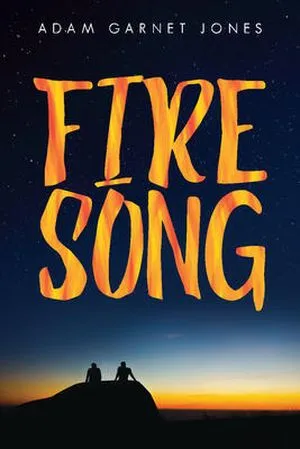
Fire Song by Adam Garnet Jones
This book is a novelization of Adam Garnet Jones’s 2015 film of the same name. Shane has been dreaming of getting off the reservation for years, and can’t wait to attend university in Toronto. His plans are put on hold after a series of family tragedies, including his little sister’s suicide and his mother’s overwhelming grief. Grieving himself, Shane turns to his best friend, David, but their relationship, which they’re hiding from the community, is full of its own complications. This is a brutal book that deals with a lot of heavy subjects, including abuse, suicide, and homophobia. But it’s ultimately a hopeful story about a queer teen coming into himself.
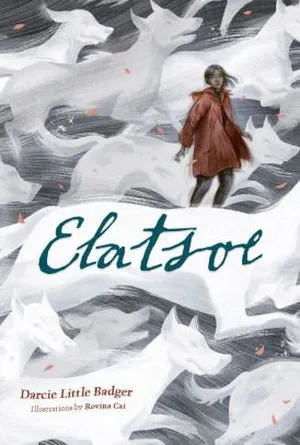
Elatsoe by Darcie Little Badger
Elatsoe is an asexual Lipan Apache teenager with an affinity for the ghosts of dead animals, including her best pal, her ghost dog Kirby. When her cousin is murdered, Elatsoe and Kirby set out to figure out what happened — a quest which leads them into a whole lot of danger and mystery. This book is brimming over with fun and joy, despite its underlying seriousness. Elatsoe is an irresistible narrator — smart, resourceful, confident, and absolutely sure of who she is and what she wants. I would follow her anywhere.
Short Story Collections
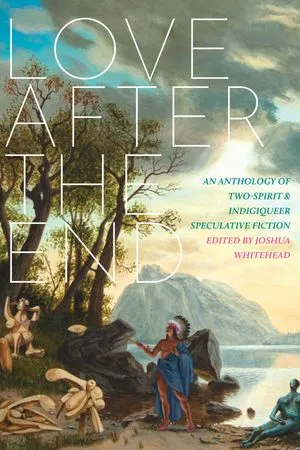
Love After the End edited by Joshua Whitehead
This beautiful collection of speculative stories by queer and Two Spirit writers is full of queer and Indigenous resilience, resistance, and creativity. The stories cover a range of topics and genres, from straight up sci-fi to dystopian and utopian narratives. A family ponders whether to leave Earth on a shuttle. A living ship contemplates its fate. Throughout, queer Indigenous characters find new ways to relate to each other, the land, and their communities, even amidst world-ending catastrophe.

Buffalo is the New Buffalo by Chelsea Vowel (June 7th in the US)
In this collection of Métis futurism, Chelsea Vowel explores the possibilities of Indigenous histories and Indigenous futures. The stories do not fit easily into genre definitions. In one, a woman uploads her consciousness onto a digital platform and becomes a buffalo. In another, a Métis superhero in the 1950s works to protect his community. Each story is followed by a short essay in which Vowel explains her writing process, inspirations, and motivations.
Looking for more LGBTQIA2S+ Indigenous books? Frustratingly, publishing still has a long way to go for queer Indigenous stories to get the kind of recognition they deserve. You’ll find some queer content on this list of graphic novels by Indigenous authors, and some on this list of sci-fi and fantasy by Indigenous authors. I also highly recommend the poetry of Tommy Pico, Billy-Ray Belcourt, Natalie Diaz, and Gwen Benaway.














